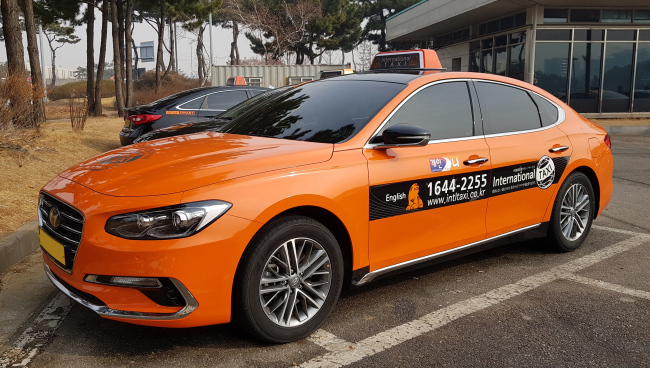Among foreign tourists, Seoul taxis are notorious for refusing services past midnight and driving recklessly. But taxis with marked “International Taxi” enjoy a reputation for friendly and superior service.

Seoul's International Taxi. Photo: Daehan Sangun
Providing services in English, Chinese and Japanese, Seoul’s foreign-language taxi fleet has been part of the city’s key strategy to boost tourism and attract more foreigners.
However, the system of city-licensed cabs faces an uncertain future due to low profitability, threatening the jobs of nearly 400 cabbies, who are experienced drivers recruited through language tests and who take pride in their work helping tourists understand the city better.
According to the city officials interviewed by The Korea Herald, Seoul is pursuing a complete privatization of International Taxi operations, aiming eliminate the annual subsidy of some $490,000 that it has been providing since 2009.
Sources said the city has not paid the subsidy for this year. The subsidy was vital for the seven local taxi companies and private for-hire drivers selected as International Taxi service providers to cover operational costs, including hiring help desk operators based on site at Incheon and Gimpo international airports.
A total of 366 International Taxis are currently in operation in Seoul -- 182 of them are company-owned, while 184 are private hire cars, according to the city.
Low profitability is seemingly the key reason for the city’s decision, which is expected to be made public later this month. Although the use of the International Taxi services totaled 94,159 cases in 2016, nearly triple the 35,951 journeys in 2009 when the service was introduced, that represents only about 258 users per day despite13.57 million foreign nationals who visited Seoul in the same year.
The city-licensed International Taxi drivers are criticizing Seoul’s approach to the tourism industry, calling it shortsighted and calling for a long-term policy.
“This job has been my life, serving the tourists visiting Seoul. Unlike ordinary cab drivers, we think we work more like diplomats, trying to connect the two cultures. I hope I get to continue doing my job because it matters, at least for some tourists,” says Jeong Sung-yon who has been an International Taxi driver at a Seoul-based taxi company since 2012.
“Although it may not be as lucrative as they thought it would be, there’s still a value in what we are doing as cab drivers,” Jeong told The Korea Herald.
Fully privatizing the city program that matches International Taxi drivers with foreigners visiting Seoul may not necessarily mean that their jobs would suddenly be at risk, but the service may eventually downsize depending on profitability, the drivers fear.
Jeong, who mostly takes customers from the Incheon International Airport to hotels in central Seoul, acknowledges the city’s concern that only a limited number of drivers with conversational fluency in another language manage to take customers on a regular basis.
But the city is “overly concerned,” Jeong insists. The estimated number of trips does not take into account those drivers who fail to report the exact number of customers they served to their companies.
“The majority of International Taxi drivers stay in contact on their own with foreign customers, who were satisfied with their services and call them again whenever they visit the city again, and their numbers are not reflected in the statistics,” Jeong says.
“They sometimes work on their own to keep loyal customers, as many as 20, and arrange pick-ups without the involvement of the help desk at the airports. The desk takes a 5 percent commission out of the total fare,” Jeong explains.
At the help desks at Seoul’s two international airports -- or through online reservation 24 hours before the pickup time -- passengers can arrange a ride in Seoul with a cab driver who speaks the language of their choice, English, Chinese or Japanese, and are notified of the rate. It typically costs 55,000 won to 75,000 won to get to downtown Seoul. Their flat fare is about 20 percent higher than regular metered taxis to account for the language services.
The ride-hailing brands can cater to the increasingly diverse needs of tourism industry -- from medical tourists from the Middle East to Southeast Asian K-pop fans who seek a one-stop taxi-booking platform here, according to an official from one of seven local taxi companies that work for the city under the two-year International Taxi contract.
“As with most industries, size works to boost growth, and the International Taxi business is now at an expansion phase even under some challenging financial circumstances,” says Kim Dae-hwan, general manager at Daehan Sangun, one of the seven local taxi companies that run city’s foreign-langauge taxi program under the subsidy.
“The city covered small ride-hailing service providers’ personnel and operational costs so they could hire more International Taxi drivers and run the business for tourists. Seoul’s abrupt decision to remove the subsidies at once would jeopardize the service’s survival despite growing satisfaction from foreigners,” Kim said.
“The city should at least continue providing part of the support until the participating taxi companies can operate independently,” Kim added. “The International Taxi is a Seoul invention, and can definitely match New York City’s yellow cabs in the future.”
By Bak Se-hwan (sh@heraldcorp.com)






